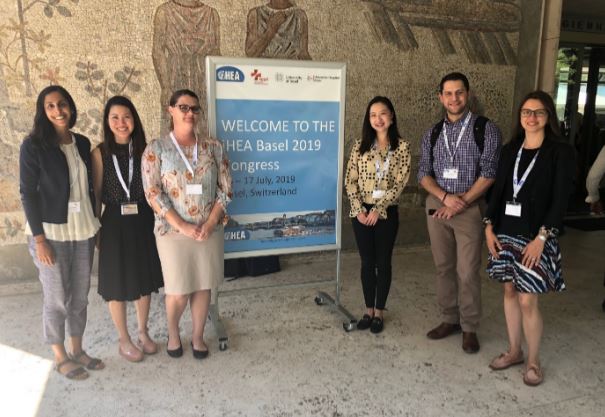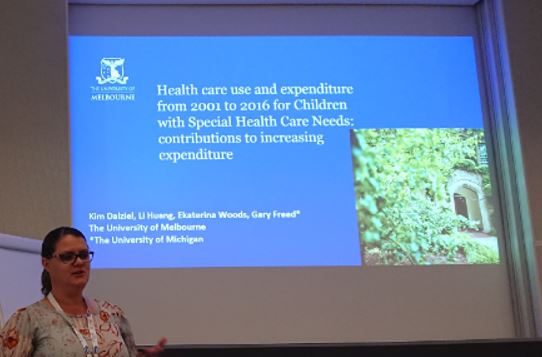Health Economics Unit team at iHEA
Left to right - Dr Natalie Carvalho, Michelle Tew, A/Prof Kim Dalziel, Eunice Wu, Dr Ilias Goanitis, Ekaterina Woods.
The Health Economics Unit had a strong presence at the International Health Economics Association (iHEA) Congress held in Basel, Switzerland in July. We were well represented by members of our team delivering presentations across a range disease areas and health economic methodologies.
A/Prof Kim Dalziel delivered a presentation on EQ-5D-Y health state preferences in Australia and Spain into an organized session on “The Measurement and Valuation of Child and Adolescent Health and Wellbeing for Economic Evaluation”. This represented collaborative work with A/Prof Oliver Rivero-Arias at Oxford University. Her second presentation was on contributions to increasing expenditure for children with special health care needs in the US, and was research conducted as part of her Harkness Fellowship 2017/18 and in a team with Li Huang and Prof Gary Freed. A/Prof Dalziel also convened a child health economics meet up attended by 17 researchers from around the world, to discuss ways to progress child health economics research and collaboration within iHEA.
Dr Natalie Carvalho delivered a long oral presentation on the importance of framing effects when deriving health-related quality of life weights. This work is a collaboration with colleagues at Stanford University. Dr Carvalho also gave a poster presentation on the cost-effectiveness of new vaccines in four Pacific Island countries, research funded by the Asian Development Bank (ADB) and carried out in collaboration with the Murdoch Children’s Research Institute (MCRI). Dr Carvalho is funded by a University of Melbourne McKenzie Postdoctoral Fellowship scheme, and received a University of Melbourne Faculty of Medicine, Dentistry and Health Sciences (MDHS) Early Career Researcher (ECR) Travel Grant to attend IHEA. Dr Carvalho also took part in the 2-day Immunization Economics pre-congress Session.
Dr Ilias Goranitis presented his work conducted under the auspices of the Australian Genomics. In his first presentation, Ilias discussed the value of incorporating experiences, information and decision weights in health economic discrete choice experiments (DCEs). The presentation was part of an organised session on ‘New insights on the application of economics and value elicitation to genomics’ and relied on a recent DCE conducted to estimate the uptake of genomic testing in Australia. In another organised session, Ilias presented the latest evidence and current challenges in allocating healthcare resources to genomic testing in Australia. He also participated in the ICECAP-A pre-congress workshop, where he presented his work on how Capability & Sufficient capability approaches can be applied in health economic evaluations.
Michelle Tew presented her PhD work on identifying quality-of-life trajectories of total knee replacement using latent class analysis and discussed its potential for assessing sub-groups and heterogeneity in cost-effectiveness analysis. Michelle also gave a second presentation on quantifying the impact of Huntington’s Disease on quality-adjusted life years and overall survival using data from a worldwide observational study (Enroll-HD). Several members of HEU, Philip Clarke, An-Duy Tran and Jay Stiles) also contributed to this work. Michelle is funded by a University of Melbourne Research scholarship and has received an OPUS Travel Award and PHIRST grant to attend iHEA.
Eunice Wu presented the study on parental health spillover effect of the rare diseases in an organized session on Family Carer spillovers in Economic Evaluation. The importance of the study and the findings on the substantial spillovers of the childhood rare genetic conditions that compromise parents’ health-related quality of life have been emphasized on during the session by the leading researchers in this field.
A/Prof Kim Dalziel at iHEA

